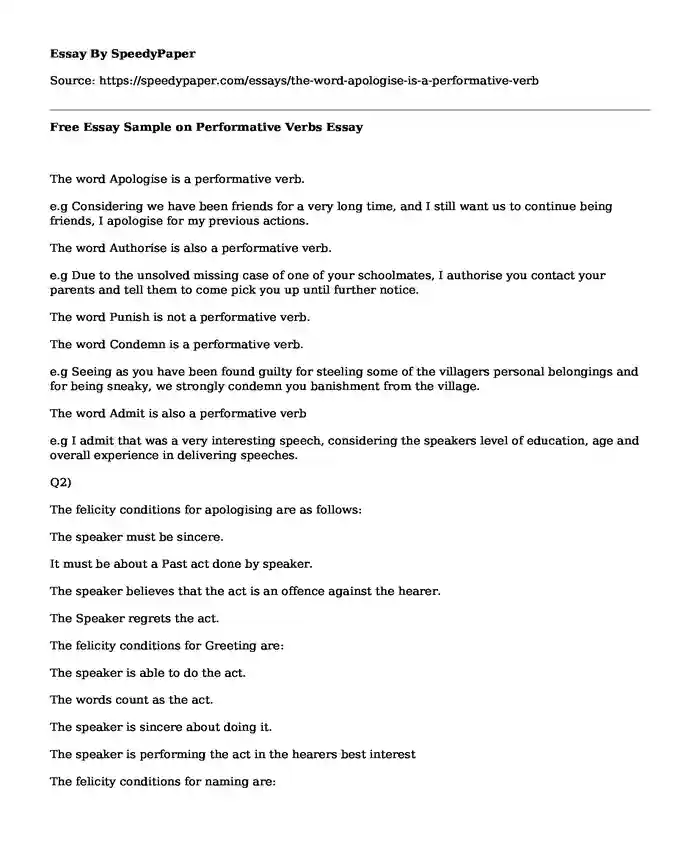
| Type of paper: | Essay |
| Categories: | English 101 Languages |
| Pages: | 3 |
| Wordcount: | 570 words |
The word Apologise is a performative verb.
e.g Considering we have been friends for a very long time, and I still want us to continue being friends, I apologise for my previous actions.
The word Authorise is also a performative verb.
e.g Due to the unsolved missing case of one of your schoolmates, I authorise you contact your parents and tell them to come pick you up until further notice.
The word Punish is not a performative verb.
The word Condemn is a performative verb.
e.g Seeing as you have been found guilty for steeling some of the villagers personal belongings and for being sneaky, we strongly condemn you banishment from the village.
The word Admit is also a performative verb
e.g I admit that was a very interesting speech, considering the speakers level of education, age and overall experience in delivering speeches.
Q2)
The felicity conditions for apologising are as follows:
The speaker must be sincere.
It must be about a Past act done by speaker.
The speaker believes that the act is an offence against the hearer.
The Speaker regrets the act.
The felicity conditions for Greeting are:
The speaker is able to do the act.
The words count as the act.
The speaker is sincere about doing it.
The speaker is performing the act in the hearers best interest
The felicity conditions for naming are:
The speaker wants the act to be done.
The speaker believes the act has not yet been done
The speaker must be appropriate.
The speaker should be the one who performs the act.
Felicity conditions for protesting are:
The speaker threatens the hearer to do the act.
The speaker believes the action should be done.
The hearer or receiver has the ability to do the act.
The act has not been carried out.
The speaker believes the hearer does not want the act to be carried out.
Q3)
What we mean when we say why dont we go to Abha this holiday? is since it is a directive, we are expressing what we the speaker want, and we actually want the hearer to do something about it.
What we mean when we say let me stress now that I agree with the chairman, is because we are being commissive, we are expressing what we intend by announcing it as much as it is not a promise.
When we say I believe you have been looking for me, we mean since it is an expositive and we are making plain how our utterances fit into the course of the conversation.
When say I must ask you to leave, on the other hand it is a declaration that effect immediate changes in the state of affairs.
What we mean when we say Dont you think you ought to phone your mother? is because it is also a directive, we make it in order to get the addressee to engage in the action.
Q4)
Considering a scenario where the speaker does not want the addressee to stand in front of the TV:
The statement Move out of the way, is a direct speech act.
The statement Do you have to stand in front of the TV, is an indirect speech act.
The statement You are standing in front of the TV, is a direct speech act.
The statement You make a better door than window, is an indirect speech act.
Cite this page
Free Essay Sample on Performative Verbs. (2020, Aug 13). Retrieved from https://speedypaper.net/essays/the-word-apologise-is-a-performative-verb
Request Removal
If you are the original author of this essay and no longer wish to have it published on the SpeedyPaper website, please click below to request its removal:
- Check City Branding Examples in Our Free Essay
- Dark Matter Essay Exam[ple
- Historical Essay Sample: Abraham Lincoln's Plans for Reconstruction of United States
- Culture of Accountability in the Workplace, HRM Essay Sample
- Essay Sample: Developing a Global Vision Through Marketing Research
- Essay Sample on Evaluating Corporate Recruiting Plan
- Free Essay - "The Ride of a Lifetime" by Robert Iger
Popular categories




